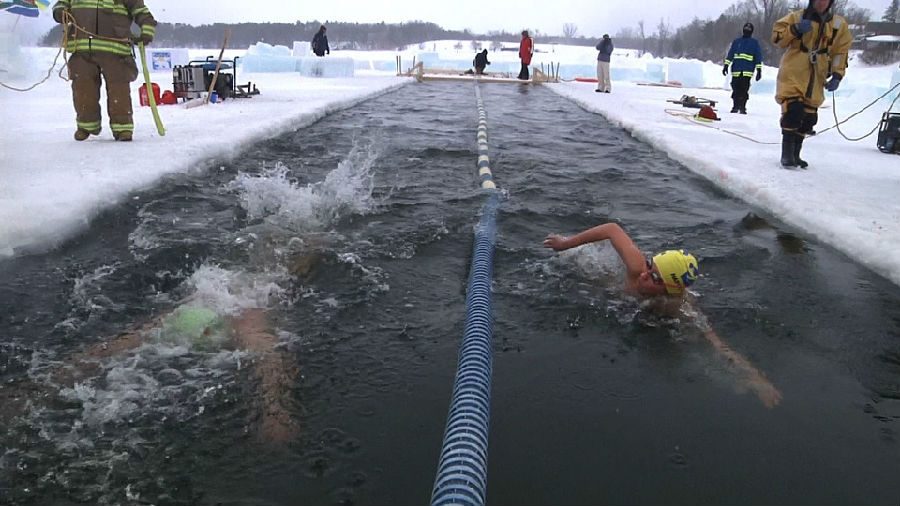冒險挑戰冰泳
People are swimming in frigid water for fun—and for health
Forget dipping your toe in the deep end.
忘記你的腳已經伸到了深水區。
In countries around the world, intrepid swimmers of all ages plunge into ice-cold waters for a thrill that can feel as sharp as daggers—and bragging rights that last all winter.
世界各國各個年齡段都有勇氣過人的游泳者跳入冰冷的水中,感受被匕首刺中般的刺激,同時獲取能夠持續整個冬天的吹牛權。
Welcome to the fun and frigid world of cold-water swimming.
歡迎來到歡樂而嚴寒的冰水游泳世界。
The hobby is nothing new.
這個愛好并不新鮮。
It’s been around for centuries in chilly climes such as Russia and Finland,
這種愛好在俄羅斯和芬蘭等寒冷地帶已經有幾百年的歷史了,
and people have been crossing the notoriously frosty, 21-mile-long English Channel without wet suits since at least the 1800s.
至少從19世紀開始,就已經有人能不弄濕衣服就游過無比寒冷,且長達34公里的英吉利海峽了。
The Coney Island Polar Bear Club hosted its first U.S. ocean dip in 1903.
1903年,康尼島北極熊俱樂部舉辦了第一屆美國海泳比賽。
And while polar plunges have become relatively common, some of these swims are not for the faint of heart.
雖然極地冰泳已經很常見了,但有時候并不適合膽小的人。
Only 11 people in recorded history, for example, have completed the so-called Ice Zero:
舉個例子,有史以來只有11人完成了所謂的零度冰挑戰:
a mile-long swim in freezing water, held in places such as Antarctica, Russia and Northern Europe.
就是在南極洲,俄羅斯和北歐等地舉行的長達1.6公里的冰泳比賽。
Communal cold-water plunges are a great way to build camaraderie—and chase better health.
集體挑戰冰泳不僅非常有利于促進友誼,對促進身體健康也很有效。
Jitka Tauferova, 76, belongs to a swimming club in the Czech Republic.
76歲的Jitka Tauferova是捷克共和國某游泳俱樂部的會員。
She says she has not gotten sick since she began cold-water swimming.
她說,自從開始冰泳以來,她就再沒有感冒過。
“The last time I had flu was 25 years ago,” she says.
“我上次感冒已經是25年前的事了,”她說。
“My back pain disappeared.
“我的背也不痛了。
Better blood circulation improves healing broken bones, and my heart is like a hammer.
血液循環得到了改善,之前受傷的骨頭愈合得也更好了,而且,我的心臟現在跟錘子一樣結實。
I feel great.”
我感覺好極了。”
She and like-minded swimmers may be onto something.
或許,她和其他志同道合的游泳愛好者大有作為。
Research has shown that swimming—the kind done in normal-temperature water, at least—is one of the best full-body workouts.
研究表明,游泳 - 即便是常溫的水——是進行全身訓練最好的辦法之一。
It’s also ideal for older people and those with pain;
游泳也十分適合老年人,以及某天某處有疼痛的人;
swimming is not a weight-bearing activity, but it still delivers all the benefits of traditional aerobics, from strengthening the heart to brightening mood.
游泳不是負重鍛煉,但它仍然能夠產生傳統健美操的所有好處,從強化心臟到調動情緒一個不落。
Scant research has explored the practice of swimming in cold water,
目前,很少有人研究冰泳這種做法,

but there is some evidence that it invigorates the body in unique ways.
但有證據表明,冰泳能夠以獨特的方式讓身體活躍起來。
In a February case report published in the BMJ,
《英國醫學期刊》2月份發表的病例報告顯示,
a young man desperate for relief from chronic nerve pain went for a minute-long swim in chilly 51°Fwater.
一名極度渴望緩解慢性神經疼痛的年輕患者在寒冷的51°F水中長時間游泳之后,
His pain immediately vanished—and didn’t return.
疼痛立刻消失了 - 而且沒有復發。
“When I came out of the water, I realized the neuropathic pain had gone away,”
“從水中出來的時候,我發現我的神經性疼痛消失了,”
he told researchers, who believe the shock of cold water could have somehow disrupted pain patterns in his body.
他對研究人員如是說,而研究人員認為,冷水沖擊可能會以某種方式擾亂他體內的疼痛模式。
“I couldn’t believe it.”
“簡直是難以置信。”
Another study, in 2008, suggested that taking cold showers could ease depression symptoms and pain,
2008年的另一項研究也表明,冷水淋浴也能緩解抑郁癥狀和疼痛,
possibly by raising levels of mood-regulating and painkilling chemicals in the blood and brain.
可能是因為提高了血液和大腦中調節情緒和止痛的化學物質的水平。


